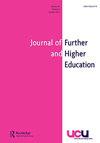Using capital, habitus and field to explore Foundation Year students’ Higher Education experiences
IF 2.4
Q1 EDUCATION & EDUCATIONAL RESEARCH
引用次数: 0
Abstract
This article explores Foundation Year students’ experiences of Higher Education learning. The research took place during the COVID-19 pandemic and provided a unique opportunity to formulate factors which contribute to the success of a Foundation Year programme. During the pandemic, the demand to study from home, created uncertainty as to whether students, classically with low confidence, reliant on university support, would cope away from a high level of face-to-face guidance during national lockdown. This article draws on qualitative data from interviews with six students from one University in England. Bourdieu’s concepts of habitus, field and capital demonstrate students can develop capital through a Foundation Year programme. This capital can be utilised during extreme learning situations like COVID-19. The findings show that the students felt prepared for independent, online learning due to the capital they had developed during the Foundation Year of their course. Initial analysis, from this small-scale project, identifies five factors which suggest an environment which is conducive to achieving study success for Foundation Year students. These factors contribute to a shift of habitus from when they first started at university.利用资本、习惯和场域来探讨预科生的高等教育体验
本文探讨了预科生在高等教育中的学习体验。这项研究是在2019冠状病毒病大流行期间进行的,为制定有助于基础年计划成功的因素提供了独特的机会。在大流行期间,在家学习的需求带来了不确定性,即在国家封锁期间,通常缺乏信心、依赖大学支持的学生是否能够应对高水平的面对面指导。本文采用了对英国一所大学的六名学生的访谈所得的定性数据。布迪厄的习惯、场域和资本的概念表明,学生可以通过预科课程培养资本。这种资本可以在COVID-19等极端学习情况下使用。调查结果显示,学生们觉得自己已经为独立的在线学习做好了准备,这是由于他们在预科课程中积累的资本。初步分析,从这个小规模的项目,确定了五个因素,建议一个环境,有利于取得成功的预科学生的学习。这些因素导致了他们刚进入大学时习惯的转变。
本文章由计算机程序翻译,如有差异,请以英文原文为准。
求助全文
约1分钟内获得全文
求助全文
来源期刊

JOURNAL OF FURTHER AND HIGHER EDUCATION
EDUCATION & EDUCATIONAL RESEARCH-
CiteScore
5.20
自引率
4.30%
发文量
80
期刊介绍:
Journal of Further and Higher Education is an international, peer-reviewed journal publishing scholarly work that represents the whole field of post-16 education and training. The journal engages with a diverse range of topics within the field including management and administration, teacher education and training, curriculum, staff and institutional development, and teaching and learning strategies and processes. Through encouraging engagement with and around policy, contemporary pedagogic issues and professional concerns within different educational systems around the globe, Journal of Further and Higher Education is committed to promoting excellence by providing a forum for scholarly debate and evaluation. Articles that are accepted for publication probe and offer original insights in an accessible, succinct style, and debate and critique practice, research, theory. They offer informed perspectives on contextual and professional matters and critically examine the relationship between theory and practice across the spectrum of further and higher education.
 求助内容:
求助内容: 应助结果提醒方式:
应助结果提醒方式:


